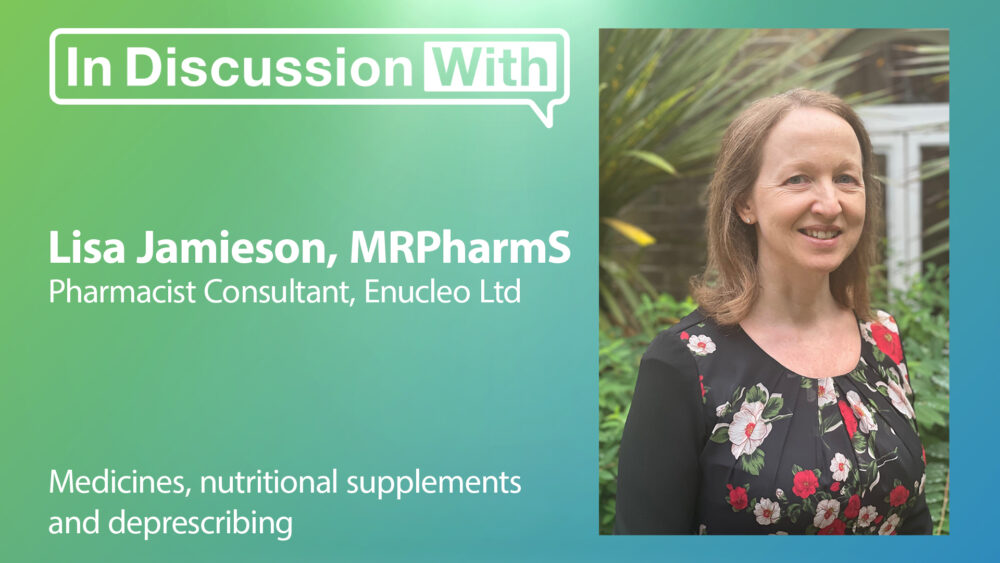Advertisment
Medicines, nutritional supplements and deprescribing

Lisa Jamieson’s interest in nutrition and nutritional supplements was sparked by some of her own experiences whilst studying for a master’s degree in nutritional medicine. In this series of short videos, she describes the roles of three key nutrients and explains how optimal diets can reduce the need for prescribed medication, in some circumstances.
How diet and nutrition impact health
“It’s important to get diet right first before we go down the route of nutrient supplements”, Ms Jamieson emphasises. There are few randomised controlled trials to support the value of food supplements. One problem is that early observational studies were based on whole diets – such as fish-containing diets but later studies were based on single ingredients such as fish oil. “When you take just one element of that food out and then put it into a capsule to … try to replicate what you’ve seen in the observational studies, there may be confounding factors [that] are often not taken into account in intervention studies”, she says.
In fact, it is possible to demonstrate causality from observational studies – as, for example, with smoking and cancer. The Bradford-Hill criteria are widely used to assess whether and observed association is likely to be casual, she explains.
Is magnesium a forgotten nutrient?
Magnesium is critical for more than 600 different processes in the body involving the musculoskeletal, cardiovascular, respiratory and neurological systems and yet we hear much less about it than iron and calcium. Magnesium deficiency can be associated with a wide range of non-specific effects. There is no simple blood test for magnesium because 99% of body magnesium is in bone and other tissues.
The typical Western diet is deficient in magnesium and so supplements are often needed. However, it is important to be aware that the bio-availability of magnesium is better from products containing amino-acid linked magnesium than from those based on magnesium oxide. “You may not necessarily get the dose that’s on packet – depending on which product you take”, says Ms Jamieson.
One approach to the management of non-specific, possible magnesium deficiency symptoms might be to try a magnesium supplement.
Why the omega-3/omega-6 fatty acid balance is critical
Ideally the diet should contain similar amounts of omega-3 and omega-6 fatty acids. However, the modern Western diet contains abundant quantities of omega-6 fatty acids, and lesser amounts of omega-3 fatty acids.
The human body needs both omega-3 and omega-6 fatty acids. They are essential fatty acids that cannot be made by the human body and must be consumed as part of the diet. Although EPA (eicospentaenoic acid) and DHA (docosahexaenoic acid) can be made in the body, recent research shows that it is better to obtain them from fish and seafood in the diet.
Omega-6 fatty acids are precursors of inflammatory mediators and omega-3 fatty acids are precursors of anti-inflammatory mediators. “A diet that’s richer in omega-3 fatty acids will be a much more anti-inflammatory diet whereas a diet that’s very rich in omega-6 fatty acids will be a more pro-inflammatory diet”, says Ms Jamieson.
A balanced intake of omega-3 and omega-6 fatty acids may reduce the need for anti-inflammatory medication. A good way to increase the amount of omega-3 fatty acids in the diet is to adopt a Mediterranean diet that is rich in vegetables, fish and seafood.
How much vitamin D do you really need?
Vitamin D is classed as a vitamin and as a nutrient. The main source of vitamin D is through the action of ultraviolet light on the skin and in the UK there is only sufficient sunlight for this to occur between the months of April and September. Currently vitamin D supplementation is recommended for everyone during the winter months. People who cover their skin, those with dark skin tones and people who are indoors all day are at high risk of vitamin D deficiency.
Dose recommendations for vitamin D vary considerably. Vitamin D receptors are found in many tissues and it is important for bone health and immune function. Vitamin D deficiency is associated with many conditions that are affected by the immune system, for example, multiple sclerosis.
One important consideration is that magnesium is needed for the enzymes that metabolise vitamin D in the body. “So, if an individual is magnesium deficient, they may take a vitamin D supplement but their body won’t be able to access the active form of vitamin D”, explains Ms Jamieson.
Vitamin D is a fat-soluble vitamin and ideally it should be taken with a fat-containing meal. Currently the recommended dose is 10 micrograms (400 i.u.) . Some people have found through a process of trial and error that they respond better to larger doses, Ms Jamieson acknowledges.
Could a good diet and supplements reduce the need for medication?
Healthcare professionals should always consider whether nutritional factors are at play when a person presents with new symptoms, even if they do not look malnourished at first glance. Some nutrient deficiencies can increase the propensity to develop indigestion or nausea, for example, a magnesium deficiency can lead to nausea. Medication may also play a role. For example, a proton pump inhibitor (PPI) may be given for indigestion but PPIs can also reduce the absorption of magnesium, iron, vitamin C and various other nutrients. Changing the diet to tackle the root cause of some of the symptoms might reduce the need for the medication, Ms Jamieson explains.
When people present with new symptoms or what appears to be a new condition it is important for frontline clinicians to consider the possibility of nutrient deficiencies which may be amenable to correction either through diet or supplements.
About Lisa Jamieson
Lisa Jamieson BPharm (Hons), MSc (Clin Pharm), MSc (Nutr Med), MRPharmS
Lisa Jamieson currently works as a pharmacist consultant from her own company, Enucleo Ltd. She has a portfolio career with two main roles – first, as a senior consultant in a market access consultancy, working at the interface between the pharmaceutical industry and the NHS and second, as a pharmacist consultant in nutritional medicine. This latter role involves educating pharmacists and other healthcare professionals either in writing or as a speaker at conferences.
Read and watch the full series on our website or on YouTube.
This episode of ‘In Discussion With’ is also on Spotify. Listen to the full podcast now.





